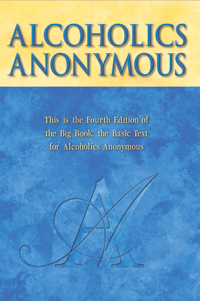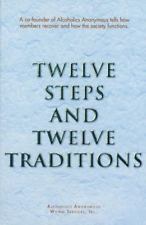


There are many references to power and authority within the program of AA. All of them serve to limit that authority, and in some cases to assert that there is none. |
 |
See several passages Here suggesting a cooperative, non-authoritarian manner in approaching a prospective new member of Alcoholics Anonymous.
"That the man who is making the approach has had the same difficulty, ... that he has no attitude of Holier Than Thou, nothing whatever except the sincere desire to be helpful; that there are no fees to pay, no axes to grind, no people to please, no lectures to be endured—these are the conditions we have found most effective."
Big Book, Page 18-19, There Is A Solution
"Most of us sense that real tolerance of other people’s shortcomings and viewpoints and a respect for their opinions are attitudes which make us more useful to others."
Big Book, Page 19-20, There Is A Solution
"The very practical approach to his [the newcomer's] problems, the absence of intolerance of any kind, the informality, the genuine democracy, the uncanny understanding which these people had were irresistible."
Big Book, Page 160, A Vision For You
12 & 12:
"Students of human relations are beginning to wonder how and why
A.A. functions as a society. Why is it, they ask, that in A.A. no member can
be set in personal authority over another, that nothing like a central
government can anywhere be seen? How can a set of traditional principles,
having no legal force at all, hold the Fellowship of Alcoholics Anonymous in
unity and effectiveness?"
Page 16, Foreword
"Students of human relations are beginning to wonder how and why A.A. functions as a society. Why is it, they ask, that in A.A. no member can be set in personal authority over another, that nothing like a central government can anywhere be seen? How can a set of traditional principles, having no legal force at all, hold the Fellowship of Alcoholics Anonymous in unity and effectiveness?"
"We believe there isn’t a fellowship on earth which lavishes more devoted care upon its individual members; surely there
is none which more jealously guards the individual’s right to think, talk, and act as he wishes. No A.A. can compel another to do anything; nobody can be punished or expelled. Our Twelve Steps to recovery are suggestions; the Twelve Traditions which guarantee A.A.’s unity contain not a single 'Don’t.' They repeatedly say 'We ought...' but nev-
er 'You must!'"
Twelve and Twelve, Page 129, Tradition One
"When told that our Society has no president having authority to govern it, no treasurer who can compel the payment of any dues, no board of directors who can cast an erring member into outer darkness, when indeed no A.A. can give an-
other a directive and enforce obedience, our friends gasp..."
Twelve and Twelve, Page 132, Tradition Two
"[T]he group now has a so-called rotating committee, very sharply limited in its authority. In no sense whatever can its members govern or direct the group."
Twelve and Twelve, Page 134, Tradition Two
"Why did we dare to say, contrary to the experience of society and government everywhere, that we would neither punish nor deprive any A.A. of membership, that we must never compel anyone to pay anything, believe anything, or conform to anything?"
Twelve and Twelve, Page 141, Tradition Three
"So confident of this had we become that the original statement of A.A. tradition carried this significant sentence: 'Any two or three alcoholics gathered together for sobriety may call themselves an A.A. group provided that as a group they have no other affiliation.'
This meant, of course, that we had been given the courage to declare each A.A. group an individual entity, strictly reliant on its own conscience as a guide to action."
Twelve and Twelve, Page 146-147, Tradition Four
"Neither [A.A.'s] General Service Conference, its Foundation Board [GSO], nor the humblest group committee can issue a single directive to an A.A. member and make it stick, let alone mete out any punishment."
"[L]ong ago, trustees and staff members alike found they could do no more than make suggestions, and very mild ones at that."
Twelve and Twelve, Page 173, Tradition Nine
"We recognize that alcoholics can’t be dictated to—individually or collectively."
"It is clear now that we ought never to name boards to govern us, but it is equally clear that we shall always need
to authorize workers to serve us."
Twelve and Twelve, Page 174, Tradition Nine